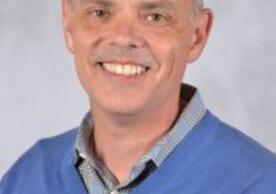
Earlier this semester, Yale School of Nursing (YSN) Associate Professor Mark Lazenby, PhD, APRN, assumed the presidency of the American Psychosocial Oncology Society (APOS), the nation’s only multidisciplinary professional society of advocates, chaplains, licensed mental health counselors, nurses, psychiatrists, psychologists, and social workers focused on the psychosocial and spiritual care of people affected by cancer. Celebrating its 30th anniversary in 2016, Lazenby is the third nurse to be president. Ruth McCorkle, the Florence Schorske Wald Professor at YSN, was APOS president in 2008.
The mission of the Society is to advance the science and practice of psychosocial care for people affected by cancer. Its vision is a nation without suffering from unmet psychosocial needs of cancer. “A diagnosis of cancer, regardless of prognosis, can cause an existential crisis for patients and families,” Lazenby said. “Unaddressed, this crisis can lead to depression, anxiety, and spiritual malaise. Without a clinician trained in the psychological, social, and spiritual aspects of cancer, patients and families often suffer alone.” Lazenby also explained that cancer care places practical burdens on patients and families. “Transportation, child or elder care, time off from work, and the money to pay for treatment are often overwhelming concerns for patients and families.” APOS works with the Cancer Support Community to staff a helpline for patients and families to address these and other concerns.
As part of its mission, APOS disseminates the latest science in psychosocial oncology through its annual meeting, which is attended by scientists and clinicians alike. At its 2016 annual meeting, which will be held in San Diego March 3-5, APOS will roll out a certification in psychosocial oncology for clinicians. It also offers quarterly Webinars.
Under his presidency, APOS will continue partnering the cancer care community to ensure that the psychological, social, and spiritual aspects are included in routine cancer care. For the last year, it has been working with the Association of Community Cancer Centers to increase the identification of patients who are in treatment for cancer who need psychosocial health care services. It has just kicked-off an initiative with Genentech to bring psychosocial perspectives to treatment decision-making in the context of new, high-tech cancer treatments. It also works with YSN on a training program to educate cancer care professionals from across the country on screening patients for psychosocial distress. This 5-year program, which is in its third year, is funded by the National Cancer Institute. McCorkle is principal investigator and Lazenby is co-investigator.
Lazenby’s term will run through December 31, 2015.
